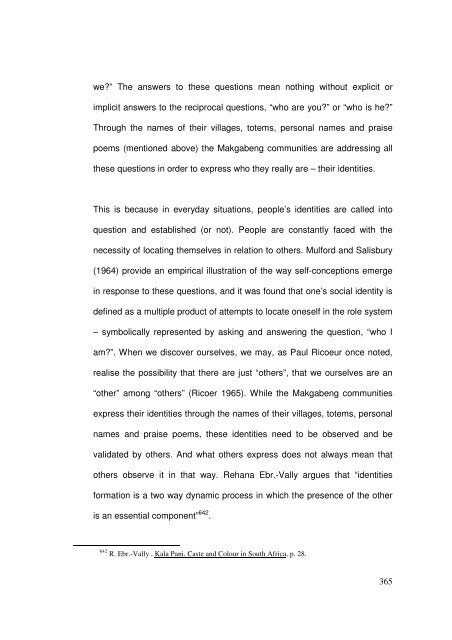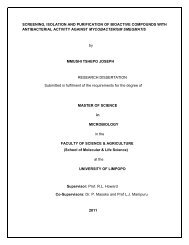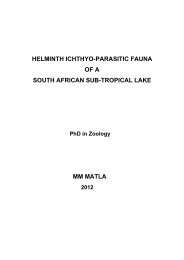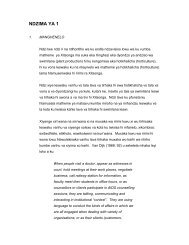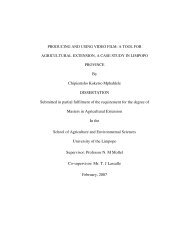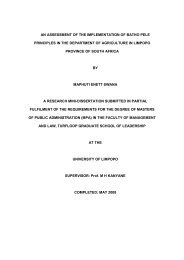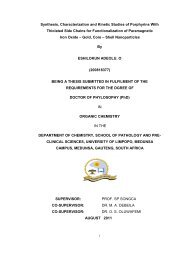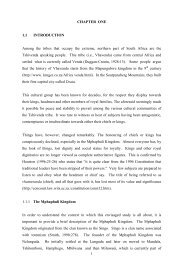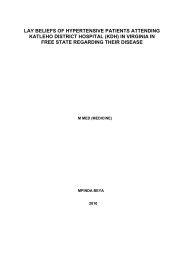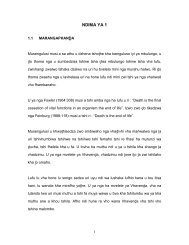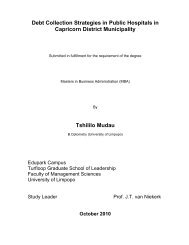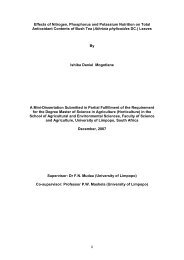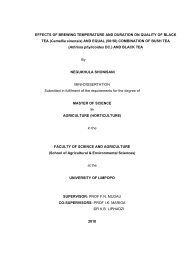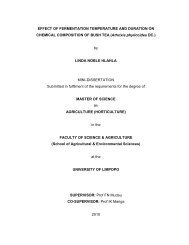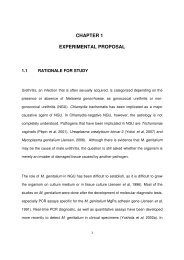- Page 1 and 2:
CHAPTER 1 INTRODUCTION TO MAKGABENG
- Page 3 and 4:
There are very few written records
- Page 5 and 6:
said that Makgabeng means “people
- Page 7 and 8:
names after they were surveyed and
- Page 9 and 10:
This study aims to portray the hist
- Page 11 and 12:
In this study on identity creation
- Page 13 and 14:
emerging continental spirit of Pan-
- Page 15 and 16:
Related to this issue, is the triba
- Page 17 and 18:
In addition to the information of t
- Page 19 and 20:
in particular. These sources were u
- Page 21 and 22:
help to fill the gaps in documentar
- Page 23 and 24:
each and every approach, depending
- Page 25 and 26:
Like politicians, traditional leade
- Page 27 and 28:
conditions were not as favourable a
- Page 29 and 30:
with my informants and reassured th
- Page 31 and 32:
sent to the interviewees before the
- Page 33 and 34:
Within twenty-four hours of conduct
- Page 35 and 36:
Bahananwa and Bakone in Makgabeng a
- Page 37 and 38:
almost all the Black communities th
- Page 39 and 40:
interdisciplinary fields as cultura
- Page 41 and 42:
will be a weak identity 40 . People
- Page 43 and 44:
ule 46 . Castells sums up this seem
- Page 45 and 46:
information, cultures, commodities
- Page 47 and 48:
Identity creation through Afrocentr
- Page 49 and 50:
concept of centre encompasses both
- Page 51 and 52:
construct rational thought. Thus, t
- Page 53 and 54:
culture to the other cultures of th
- Page 55 and 56:
dependent on the nature of the cont
- Page 57 and 58:
contested, negotiable and construct
- Page 59 and 60:
others and are identified by them i
- Page 61 and 62:
shared identities can transcend obv
- Page 63 and 64:
in identities help individuals or g
- Page 65 and 66:
Another theoretical argument is tha
- Page 67 and 68:
cultural forms,… thus all identit
- Page 69 and 70:
environmental changes. Focus will b
- Page 71 and 72:
since the origin of humankind, its
- Page 73 and 74:
een interacting with one another in
- Page 75 and 76:
and 1200 metres 99 . It represents
- Page 77 and 78:
These names help people to define a
- Page 79 and 80:
C3-type grasses dominate 115 . The
- Page 81 and 82:
their homesteads 119 . In the Makga
- Page 83 and 84:
ange of wild animals indigenous to
- Page 85 and 86:
In addition to the contact between
- Page 87 and 88:
The above accounts indicate how the
- Page 89 and 90:
Early occupation. Archaeological ev
- Page 91 and 92:
San include “sympathetic magic”
- Page 93 and 94:
interacted with other groups, espec
- Page 95 and 96:
scale crisis between the San groups
- Page 97 and 98:
underground foods 147 . These consi
- Page 99 and 100:
population groups which later appea
- Page 101 and 102:
een any reports and evidence of “
- Page 103 and 104:
words, identities may be expressed
- Page 105 and 106:
cultural mixing and influencing, th
- Page 107 and 108:
As already alluded to, the Khoikhoi
- Page 109 and 110:
stock probably through their contac
- Page 111 and 112:
The Bantu-speaking communities. The
- Page 113 and 114:
speaking communities. Because of th
- Page 115 and 116:
is precisely because of the theoret
- Page 117 and 118:
Makgabeng area, even though the roy
- Page 119 and 120:
protection. The alignment of variou
- Page 121 and 122:
CHAPTER 4 POLITICAL CHANGES BROUGHT
- Page 123 and 124:
The earliest inhabitants in the Mak
- Page 125 and 126:
paintings they made on rocks, as we
- Page 127 and 128:
plains. However, it is clear that t
- Page 129 and 130:
establishing the South African Repu
- Page 131 and 132:
developments such as the arrival of
- Page 133 and 134:
British 219 . On his fugitive way,
- Page 135 and 136:
occupied areas which best suited th
- Page 137 and 138:
at a macro-level and also filtered
- Page 139 and 140:
and Batau, sought sanctuary under t
- Page 141 and 142:
when in 1852 when the British recog
- Page 143 and 144:
significance of these developments
- Page 145 and 146:
of Malebogo 244 . The police force,
- Page 147 and 148:
therefore very reluctant - if not u
- Page 149 and 150:
Boer triumph on the north-eastern s
- Page 151 and 152:
driven by various reasons, found th
- Page 153 and 154:
shape political identities in the M
- Page 155 and 156:
Why is it that you call them to liv
- Page 157 and 158:
missionaries shaping only religious
- Page 159 and 160:
military camp during the Bahananwa-
- Page 161 and 162:
missionaries, the Boer farmers and
- Page 163 and 164:
Lutheran and Wesleyan missionary co
- Page 165 and 166:
with its scenic beauty 276 . One of
- Page 167 and 168:
the expulsion of Beyer, and his rep
- Page 169 and 170:
chapter, however, their core functi
- Page 171 and 172:
Lues, leprosy and insanity - terrib
- Page 173 and 174:
Blouberg 300 . The British-originat
- Page 175 and 176:
African evangelists independent of
- Page 177 and 178:
worshipping (and of course, the Kho
- Page 179 and 180:
The Wesleyan teachings under Setumu
- Page 181 and 182:
(magadi). The missionaries, armed w
- Page 183 and 184:
know who has died up there as no he
- Page 185 and 186:
political and social contexts are d
- Page 187 and 188:
The system of polygamy was an impor
- Page 189 and 190:
to Desia Ramoroka 334 , her mother-
- Page 191 and 192:
changed as a condition of them bein
- Page 193 and 194:
planks for doors, but when Sack did
- Page 195 and 196:
ase on the south-western side of th
- Page 197 and 198:
The missionaries’ importation of
- Page 199 and 200:
y the new ones of the western docto
- Page 201 and 202:
as far back as the earliest occupan
- Page 203 and 204:
etween clearly distinguishable poli
- Page 205 and 206:
move freely everywhere in the entir
- Page 207 and 208:
The expansion and settlement of com
- Page 209 and 210:
ownership, and land’s related res
- Page 211 and 212:
Black communities, were entered int
- Page 213 and 214:
they knew of land being privately o
- Page 215 and 216:
the basis of a number of financial
- Page 217 and 218:
1. Baranen was originally granted t
- Page 219 and 220:
therefore granted these farms to th
- Page 221 and 222:
The fate of Blacks, which was a com
- Page 223 and 224:
As a result of Black issues such as
- Page 225 and 226:
Commissioner for Native Affairs in
- Page 227 and 228:
as well as sizes of farms in morgen
- Page 229 and 230:
were no longer belonging to their o
- Page 231 and 232:
19. Rosamond was surveyed by R.E. A
- Page 233 and 234:
new developments on their land. App
- Page 235 and 236:
Opportunities for purchasing land w
- Page 237 and 238:
B: 54/98 Taletje Ngoepe from the fa
- Page 239 and 240:
traditional communal tenure in whic
- Page 241 and 242:
The sub-Native Commissioner in Piet
- Page 243 and 244:
that occupation shall convey no own
- Page 245 and 246:
communal arrangement came under sie
- Page 247 and 248:
y the 1936 Act in which trust farms
- Page 249 and 250:
egan to sell some of those farms fo
- Page 251 and 252:
of deputy-chief Kgare of Moletji wh
- Page 253 and 254:
Native Trust and to make further pr
- Page 255 and 256:
occupation and ownership. This grou
- Page 257 and 258:
landowners, the farms in the Makgab
- Page 259 and 260:
Section 5(a) Black polities could b
- Page 261 and 262:
experiences, and this further shape
- Page 263 and 264:
agreeing to the contents of the min
- Page 265 and 266:
In the Makgabeng area, the examples
- Page 267 and 268:
situation exactly the same as in Ro
- Page 269 and 270:
Affairs, Hendrik Verwoerd 458 . The
- Page 271 and 272:
were now selling it 461 . On the ot
- Page 273 and 274:
were in this office and they agree[
- Page 275 and 276:
esulting in the assassination in 19
- Page 277 and 278:
landowners, these pioneers of the p
- Page 279 and 280:
The tensions which emanated from th
- Page 281 and 282:
Moletji 484 , even though their far
- Page 283 and 284:
Calvin was not only able to establi
- Page 285 and 286:
co-operation. For instance, they ha
- Page 287 and 288:
eserves could not support the 500 0
- Page 289 and 290:
held by the Lebowa homeland governm
- Page 291 and 292:
ather than the citizens of Lebowa.
- Page 293 and 294:
itself in which people and ideas fl
- Page 295 and 296:
(present-day Botswana) on their way
- Page 297 and 298:
whom since the beginning of the yea
- Page 299 and 300:
The impact of South Africa’s mine
- Page 301 and 302:
who became wealthy in the diamond f
- Page 303 and 304:
concentrate on subsistence in the r
- Page 305 and 306:
especially after initiation 530 . T
- Page 307 and 308:
Makgabeng area - the Matlala and Ma
- Page 309 and 310:
In the Makgabeng area, the recruitm
- Page 311 and 312:
In the earliest days of migrancy, w
- Page 313 and 314: (both Boer and British), introduced
- Page 315 and 316: ecruitment and regulation of the la
- Page 317 and 318: facilities for lonely men in those
- Page 319 and 320: shaped by this sharing and interact
- Page 321 and 322: The costs of transporting the corps
- Page 323 and 324: come to the township, the rural fam
- Page 325 and 326: sheep. This accumulation of livesto
- Page 327 and 328: Native Commissioner, Pietersburg, B
- Page 329 and 330: cooking oil, were some of the commo
- Page 331 and 332: For instance, the school, Makgabeng
- Page 333 and 334: changes which some of them were tem
- Page 335 and 336: addition to the communal identity c
- Page 337 and 338: names in South Africa 595 . There a
- Page 339 and 340: As already pointed out in Chapter 6
- Page 341 and 342: purchase farms. People of different
- Page 343 and 344: the same farm. However, regardless
- Page 345 and 346: co-purchasers from various origins
- Page 347 and 348: Mpumalanga). Makgabeng is in the Ca
- Page 349 and 350: produced by labelling) 606 . For in
- Page 351 and 352: For instance, Kgoši Ratšhatšha L
- Page 353 and 354: eciprocal questions, “who are you
- Page 355 and 356: which had to be fought against as i
- Page 357 and 358: their distinctive dinaka dance form
- Page 359 and 360: own families because with their new
- Page 361 and 362: different tones. The main differenc
- Page 363: after a number of girls 630 . For i
- Page 367 and 368: study to argue about the lines betw
- Page 369 and 370: purchases were the Bapedi. This is
- Page 371 and 372: Africa. In the Makgabeng area, as a
- Page 373 and 374: after the livestock while they also
- Page 375 and 376: egarding the youth. Dolby argues th
- Page 377 and 378: not only drink traditional sorghum
- Page 379 and 380: BIBLIOGRAPHY A. PRIMARY SOURCES. AR
- Page 381 and 382: 15. Volume 113 NA533/ 03, Native Af
- Page 383 and 384: 39. Volume 2/2/67, Part 1, Chief Ma
- Page 385 and 386: 69. Volume1233, Pietersburg trading
- Page 387 and 388: REPORTS • File Ref No. A2/10/3 (i
- Page 389 and 390: • Anon. Nachrichten von unserer S
- Page 391 and 392: 7. Sania Ramoroka. 8. Nkadi Ngwepe.
- Page 393 and 394: Bam, J. and Visser P., A New Histor
- Page 395 and 396: Hammond-Tooke, W.D., The roots of A
- Page 397 and 398: Van Warmelo, N.J., Die Tlokwa en di
- Page 399 and 400: Boshier, A., et al., “Mining in S
- Page 401 and 402: THESES. Boersema, M., Die malopokul
- Page 403 and 404: Makgabeng situated next to the smal
- Page 405 and 406: MAKGABENG TOPOGRAPHICAL MAP MOGALAK
- Page 407 and 408: Vergelegen MAKGABENG VEGETATION MAP


